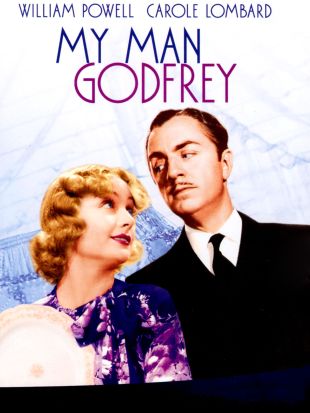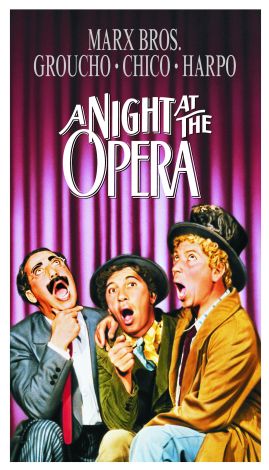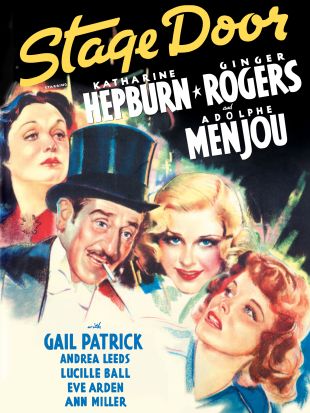Morrie Ryskind was a major behind-the-scenes literary figure in American pop culture for at least four decades. He was never widely acknowledged as a longtime associate of George S. Kaufman, but he was a success both on Broadway and in Hollywood. He was associated with the Marx Brothersfor a duration of his career. He was also very visible in the political world at different times in his life, working for the two extremes -- the pacifist left in the '30s, and the far right in the '50s and '60s. Ryskind was born in Brooklyn, New York, to a Russian immigrant family, and, in keeping with this background, he was drawn to socialist politics. He attended Columbia University's School of Journalism, but was dismissed because of his outspoken political views.
Politics played a significant role in Ryskind's work from the very beginning. In Garrick Gaieties (1925), Ryskind got strong reviews for a sketch that burlesqued the home life of then President Calvin Coolidge. (This august show was where Richard Rodgers and Lorenz Hart first achieved notice, and the show also featured a gifted young player named Sterling Holloway.) This gave the public its first taste of the wit that would later inform Of Thee I Sing, a much more topical and celebrated political work that had fun at Coolidge's expense. Ryskind began collaborating with George S. Kaufman in the mid-'20s. The two had a huge hit in 1925 with The Cocoanuts, a wildly paced play (inspired by the early '20s Florida land rush) starring the Marx Brothers. This was followed at the end of the decade with another hit, Animal Crackers, which introduced Groucho Marx's most famous characterization of Captain Spaulding, the African explorer, and his signature theme.
In 1929, during the period when the quartet was performing Animal Crackers on the Broadway stage, they took time out to go to Astoria Studios in Queens, New York, where they made the film The Cocoanuts, adapted from the play. Ryskind and Kaufman also did the screenplay for the film Animal Crackers, which was shot a couple years later and is widely considered to represent the peak of the Marx Brothers' early screen work (also, because of rights complications, a "lost" movie until the '70s).
The tendency among Marx fans is to attribute the cleverness of the their dialogue and repartee to the actors themselves, but they were always working from scripts (albeit usually written around their attributes), and Ryskind and Kaufman were the two authors most responsible for these scripts. Even on the films where they didn't do the writing, their work on The Cocoanuts and Animal Crackers had established the actors' screen personae. Beyond writing for the Marxes in 1931, Ryskind and Kaufman co-authored Of Thee I Sing, a topical political satire that became the first musical to win the Pulitzer Prize for drama. The play also ran into a curious problem in 1933 -- due to its topicality with the death of former President Calvin Coolidge, several jocular references to the late president had to be altered in subsequent productions out of respect for the man. Ryskind also co-wrote the screenplay for Gregory La Cava's piercing Depression-era comedy My Man Godfrey (1936), which was laced with acid-tongued criticism of the idle rich that set the pattern for what became known as "screwball comedy." He earned Academy Award nominations for that script and also for his screenplay for La Cava's Stage Door (1937). Though he strayed far from the Marx Brothers' territory, he never seemed able to get too far from them for that long, much to their benefit. Ryskind was largely responsible for writing the screenplay for A Night at the Opera, the movie that revived the brothers' professional fortunes, and he was also heavily involved in the script's cleanup process, watching the team perform key sections of the work in front of live audiences, night after night, seeing which lines worked and which ones didn't. Ryskind was also responsible for rewriting the stage version of Room Service, the original of which didn't have the Marxes or anyone like them in it; he put their roles in and reworked the plot to make the movie suitable for the three distinctive performers. He also found time at the end of the '30s to participate heavily and publicly in Socialist Party-sponsored antiwar activities, signing his name to advertisements and performing sketches at events in support of this cause.
During the '40s, Ryskind separated himself from the Marx Brothers at last and wrote the scripts for such popular films as Penny Serenade and Claudia. He also worked on the stage musical Louisiana Purchase and supervised the production of The Lady Comes Across. In 1947, the writer appeared before the House Un-American Activities Committee, where he denounced the American left and renounced his former political activities. During the '50s, Ryskind joined the John Birch Society, an ultra right-wing organization who advocated the notion that President Dwight D. Eisenhower (former General of the Army) was secretly pursuing a pro-Communist agenda. Ryskind also lent money to William F. Buckley Jr. to start his rightist counter-establishment magazine The National Review. In 1960, he began an 11-year stint writing a right-wing opinion column for the Los Angeles Times. Ironically, even as he was railing against the direction of the United States government and American society in the '60s, a new generation of American students were discovering the Marx Brothers' movies and finding inspiration in their nihilist, anti-establishment ideals -- a good portion of which came from Ryskind. Ryskind's writing in the '60s didn't have nearly the impact and influence that it did in the '30s. When he died in 1985 at age 89, his last 35 years of politicking was largely overlooked, and his youthful triumphs remain his enduring legacy.


